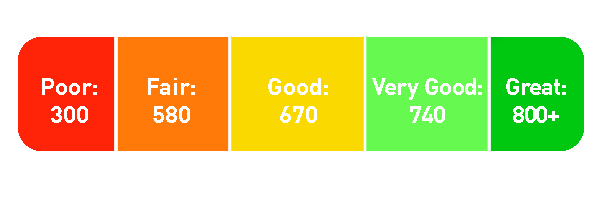
9 Free Financial Apps You Need to Try
April 29, 2019
How Many Investment Options Should You Offer?
May 10, 2019Credit scores, for better or worse, affect a large portion of your financial life. From assessing if you are eligible for loans or renting a property, to determining the amount interest you pay, having a positive credit history can greatly influence your major life choices and financial planning.
For many, the intricacies of establishing or boosting a credit score is unknown terrain- which is understandable. You’ve probably heard of terms like “FICO Score” or perhaps even one of the three major credit bureaus, Experian, Equifax, or TransUnion: But what do these terms all mean, and how do they work to measure your score?
We have put together a comprehensive guide to help you better understand and control your credit score. For more information on improving your credit score or establishing a financial strategy, please contact one of our team members to learn more.
What Is the Difference Between A Credit Score and A Credit Report?
Experian defines credit score as “number lenders use to help them decide how likely it is that they will be repaid on time if they give a person a loan or a credit card.” In a nutshell, your credit score is an assessment of your credit risk- namely, how likely you are to repay your debts in a timely and responsible manner.
A credit score is based on the information provided by your credit report. This includes your credit and payment histories, the amount of debt you have, and the types, age, and a number of credit accounts that you have acquired. Anytime that you apply for a loan, want to open a new credit card, or apply to sign a lease, the lender will request a copy of your credit report from a credit bureau. Remember, Experian, Equifax, or TransUnion, that we mentioned earlier? This is where their role comes in to play.
Upon request, each credit bureau is obligated to give you a free copy of your credit report once a year. We suggest spacing these out during the year, requesting one from each bureau approximately every four months. Your credit report is a great way to gain a deeper insight into your financial picture and uncover any discrepancies or fraudulent activity in your name. To ensure that your information and credit is not being used inappropriately, use Legal & Identity Shield for year-round protection and to be notified when a transaction is made in your name.
Determining Your Credit Score
The most common types of credit scores you will use are FICO scores and Vantage Scores. Let’s break these down further. Although they are similar in nature, the main difference between the two is which factors of your credit report they take into consideration and to what degree.
FICO Score:
Ranges from 300 – 850 with an average score of about 600.
Affected by 5 categories:
Payment History (35%)
Amounts Owed (30%)
Length of History (15%)
Credit Mix (10%)
New Credit (10%)
VantageScore:
Developed by the 3 major credit bureaus including Experian, Equifax, and TransUnion. Similar to a FICO Score, consumers’ scores fall on a scale between 300 – 850 with an average score between 550-649.
Affected by 7 categories:
Payment History (40%)
Type, Number, and Age of credit accounts (21%)
Credit Utilization Rate (20%) (How much you currently owe divided by your credit limit)
Balances (11%)
Recent Credit (5%)
Available Credit (3%)
What is considered a good score?
Scores typically fall on a scale from Poor to Excellent as shown below:

So, How Do You Build Credit?
Building and improving your credit score is a process that takes time. Although it is best to be proactive and make strides to positively improve your score, keep in mind that it can take 30—60 days to reflect on your credit report.
- Dive in and open your first card. Select a card with a low spending limit and aim to use your new card for small, limited purchases that you can easily pay off to establish a positive credit history
- Become an authorized user on a family members accounts who have an existing credit history. This serves as an opportunity to demonstrate responsible repayment behavior and can help to increase your chances when applying for credit on your own.
- Make punctual payments. If you have student loans, rent, or auto payments, make sure that you are making your payments on time (or even better, early) each month to help build credit.
- Apply for a Secured Card. Similar to any ordinary credit card, you can make your purchases, pay your bills, and will be charged interest if you do not pay it off in full. The difference is that a secured card requires an initial cash deposit that is usually proportionate to your credit limit.
- Be Selective. Opening too many lines of credit can impair your score and can be harder to manage in the long run.
Establishing and improving credit can feel like an uphill battle. However, with diligent and strategic efforts, in addition to a thorough understanding of how your score works, you can take a step in the right direction and have a positive impact on your score. For more information on boosting your credit score or mapping out a financial strategy, please contact one of our team members to learn more.




